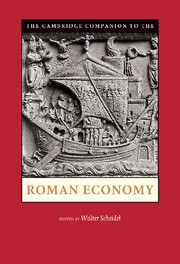Book contents
- Frontmatter
- Contents
- List of Figures
- Note on the Contributors
- Abbreviations
- The Roman world at the time of Marcus Aurelius
- 1 Approaching the Roman economy
- Part I Theory
- 2 Roman economic thought
- 3 The contribution of economics
- 4 Human capital and economic growth
- Part II Labor
- Part III Production
- Part IV Distribution
- Part V Outcomes
- Further reading*
- Bibliography
- Index
2 - Roman economic thought
from Part I - Theory
Published online by Cambridge University Press: 05 February 2013
- Frontmatter
- Contents
- List of Figures
- Note on the Contributors
- Abbreviations
- The Roman world at the time of Marcus Aurelius
- 1 Approaching the Roman economy
- Part I Theory
- 2 Roman economic thought
- 3 The contribution of economics
- 4 Human capital and economic growth
- Part II Labor
- Part III Production
- Part IV Distribution
- Part V Outcomes
- Further reading*
- Bibliography
- Index
Summary
The history of economic thought, rooted in (moral) philosophy and jurisprudence, is readily analyzed using general principles that equally apply to ancient and modern thought. It seems almost a platitude to say that ancient sensibilities differed from our own, or even from those of medieval Europe, shaped as it was by Christianity, and that we should not lose sight of this. This observation, however, is far from redundant considering that a great deal of (pseudo)history of thought has been done by adapting the work of one author to a theoretical grid worked out by another, sometimes in a later period.
The Romans, like the other ancients, lacked a systematic view of economics, either as an abstract theory or as an activity independent of politics. Though this may appear an endorsement of the Polanyian conception of economics “embedded” in other categories, the picture has now become more complex. After the traditional division into “primitivists” and “modernizers,” and Finley's “new orthodoxy,” the recent institutional approach raises fresh doubts. The basic principle that institutions are involved in economics as soon as transactions reach a relevant size (and cost) is acceptable; but to attribute “the fundamental assumption of scarcity” of neoclassical theory to ancient economic thought appears excessive. Only in modern thought is the postulate of scarcity required to define an economic good; at most, antecedents may be found in the medieval debates on value that inspired the analysis of exchange, reflected in the formulation of concepts such as indigentia (i.e., wants), an idea destined to play an important role in later economic thought.
- Type
- Chapter
- Information
- The Cambridge Companion to the Roman Economy , pp. 25 - 44Publisher: Cambridge University PressPrint publication year: 2012
- 6
- Cited by

